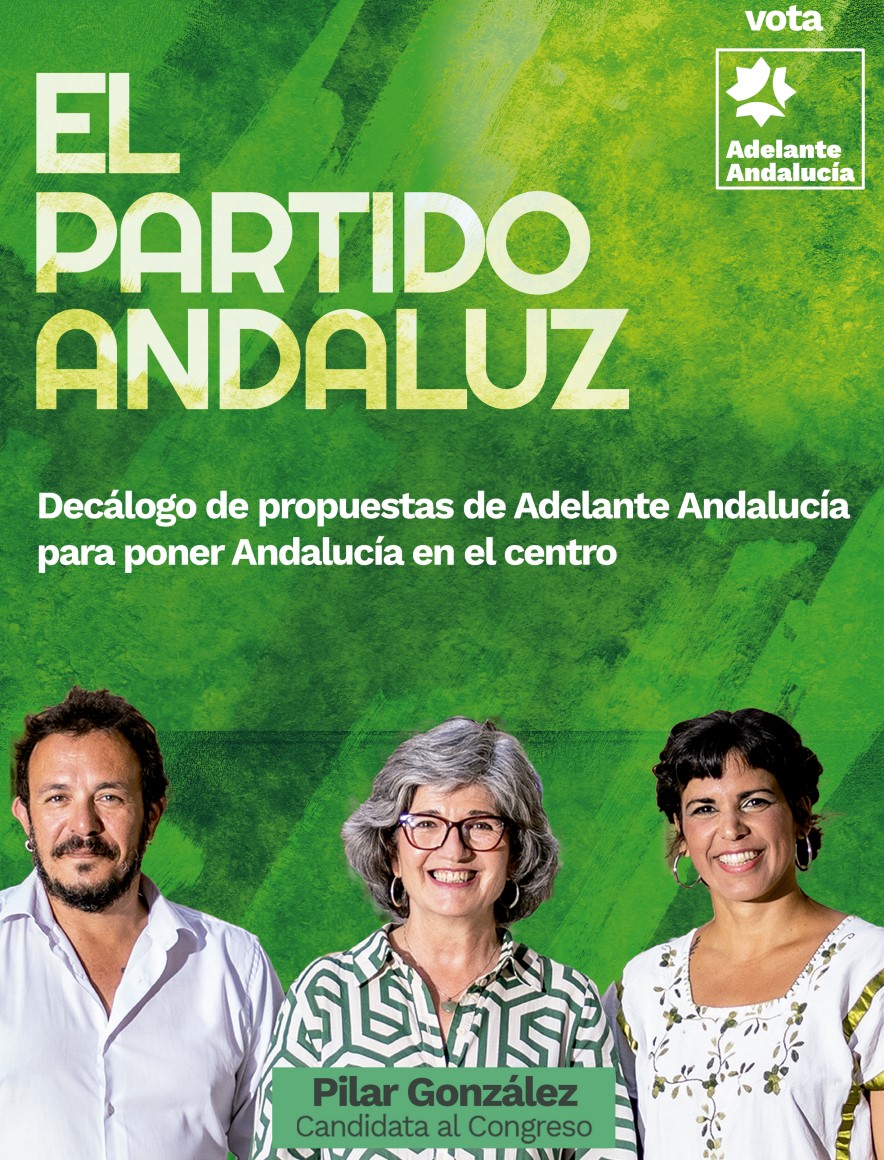Dave Kellaway of Anti*Capitalist Resistance assesses what is at stake in Sunday’s general election in the Spanish state.
With under a week to go, the polls continue to give the mainstream conservative party, the PP (People’s Party), a lead of four percentage points over the governing PSOE (Socialist Workers Party—social democratic). Sanchez, the current Prime Minister, may still scrape through, but it cannot be excluded that the PP may get a majority on its own—the electoral system disproportionately benefits the rural seats where the conservatives are stronger—but it is likely that it will have to rely on the support of the hard-right, post-fascist Vox (Voice party). At the moment, this group has many direct links with the fascist Francoist regime (Franco only died in 1975). This makes it less post-fascist than groups like Meloni’s Fratelli d’Italia in Italy.
Already, Vox has gone into government with the PP in several regions following the recent elections. Open attacks have been stepped up on women’s right to control their own bodies, against gay and trans people, and to stop the law on memory that helps provide the truth about the Franco regime’s repression. It looks likely that despite PP leader Feijoo’s election bluff at getting his own majority, he will deal with Vox to form a government.
As we see elsewhere in Europe, there is an interaction between the mainstream right and the hard-right post-fascists, whereby they both influence each other. The mainstream takes on more and more hard-right policies, particularly those linked to culture wars and anti-migrant racism. The post-fascists try to look a bit more like the mainstream right wing by reducing and minimising their links with a fascist past, which keeps any militia-style organising well out of sight. Indeed, Vox, like the Fratelli in Italy or the RN in France, prioritises getting influence inside the police and army.
| Party | % vote | seats |
| PSOE | 28.2 | 101-109 |
| PP | 32.0 | 130-138 |
| Vox | 14.1 | 35-41 |
| Sumar | 14.0 | 34-40 |
| Others (nationalists mostly) | 11.7 | 32-40 |
Sanchez has gambled with this snap election. He could have waited until the end of the year. He hopes to take advantage of a reflex among progressive forces against the entry of the post-fascist Vox into regional and local governments. Maybe he thinks that he has a better chance of generating that reaction during the initial stages of the formation of these governments before the outcry dies down. Certainly, he is risking his political career if he is defeated. It is still too close to call, and it may all end with an unstable political deadlock that will mean going to the polls again in the short term.
The right-wing forces have benefited from the collapse and dissolution of the so-called modernising centre-right Cuidadanos party. The latter’s votes have mostly transferred to the PP. Although there is much talk of Vox, the main increase in votes, according to the surveys, has been for the PP rather than the post-fascists. Vox is forecast to get fewer seats at the moment than the 52 it got last time. The PP, on the other hand, is predicted to increase its seats from 88 to over 130. The main focus of Sanchez’s campaigning has been on the right-wing threat rather than proposing any sort of policy that will decisively deal with the cost of living crisis or the need for greater social spending. Upping the verbal ante of anti-fascism and the threat to democracy did not really work in the last general elections in France and Italy. Maybe the massive increase in abstention and alienation from the political process makes such invocations less convincing.
What about those currents to the left of the PSOE?
Podemos was a political current that built itself on the radical street mobilisations of the Indignados 15M movement in 2011. Its founders included the revolutionary Anticapitalistas current. Its political programme called for a clear break with the existing regime and for a new arrangement for the nations (like Catalonia and the Basque Country) of the Spanish state. Its strategy was to build a new sort of movement quite distinct from the traditional PSOE or PP. Iglesias, its charismatic leader, called on its militants to overtake the PSOE at the ballot box. Now it has come full circle. It built itself on a different trajectory from the old CP United Left, which acted as a left satellite ally of the PSOE; some of its founders, like Iglesias, had personally broken with that tradition. Yet by 2018 and the victory of the PSOE in the general election, Podemos had jumped back on the old bus and fully joined up with the PSOE government. Podemos leaders had their ministries, there were many career openings for its cadres, and its apparatus could be consolidated. As day follows night, this turn logically meant that forces inside Podemos would complete the ideological trajectory towards more moderate policies.
So Yolanda Diaz, who was a deputy prime minister and a Podemos leader, launched a new political movement called Sumar (Come Together) and laid down an ultimatum to her comrades: Join me in a new broader electoral coalition. Unlike the foundation of Podemos with congresses, motions, programmes, and debate, this new movement seems to be entirely built around Diaz. Podemos was never that democratic, but Sumar seems worse. Diaz’s rhetoric about building a new progressive movement does not extend much reflection about the active involvement of activists in how their organisation is run. Melenchon’s France Insoumise has similar problems with internal democracy, and this issue has been mostly unresolved in all the new left radical movements in the last decade. Syriza’s leadership in Greece was able to ignore the majority position of the membership over its policies.
Despite quite a lot of rancour, especially around whether you were given a winnable seat on the Sumar slate, Podemos agreed to follow Diaz. The old United Left ally and an earlier moderate split from Podemos, Errejon’s Mas Pais, were Sumar supporters from the start. Currently, Sumar is competing with Vox for third place on around 13–14%, which is roughly the score Unidad Podemos got last time. It does not appear that Sumar is tapping into any new areas of support. From its origins in Podemos, a new political current based on a movement from below and with a view of breaking with the system, Sumar has become mostly about fighting over which positions you can hold on to in the institutions.
The left campaigns to prevent a PP/Vox government; indeed, it defends the reforms made by the PSOE/UP government in the realm of democratic, labour, or LBGTQ rights. But it refuses to be silent on the record of this government—for example, Sanchez did nothing to stop the massacre of migrants in Melilla in 2022. Reforms to the notorious Mordaza or Gag Law are limited; it still gives police the right to interpret ‘lack of respect’ or ‘disobedience’. The changes to the pro-business labour laws did restrict the use of temporary contracts, but much of the previous right-wing law remained on the statute book. The continuity with the PP’s labour reform is such that Mariano Rajoy, the right-wing prime minister who oversaw the law, told the conservative ABC newspaper that the PSOE and Podemos “left the labour reform where it was.” The reforms to housing law do cap rents at 3% and give some more rights to renters, but the government has done little to build more social housing.
Former Labour Party Prime Minister Gordon Brown, in an article in the Guardian, correctly warns of the international threat of far-right and neo-fascist forces. He shows how Vox is calling for nationalist parties to be outlawed and wants to weaken laws and policies on domestic violence. However, the whole article uncritically hails Sanchez as a champion of progressive forces. a defender of migrants (Melilla?) and an opponent of neo-liberal austerity.
Radical left currents that win seats in parliament do not have to go into coalition with social liberal parties like the PSOE. They can still prevent the election of right-wing governments and allow mainstream left-of-centre parties to form governments. In Portugal, the Left Bloc did precisely that while not going into coalition. It is also possible to negotiate around certain measures in exchange for your votes. At the same time, you can continue to develop a movement that defends workers interests with a strategy of a clear break with capital and its state.
Next Sunday’s vote will make a difference in the conditions in which the left and progressive forces can operate. The right and neo-fascists must be voted against and stopped, but an alternative to the PSOE’s slightly more liberal management of the capitalist economy needs to be built.
18 July 2023
Originally published by Anti*Capitalist Resistance: https://anticapitalistresistance.org/spanish-general-election-23-july-can-the-right-be-stopped/
Picture: Adelante Andalucia an electoral coalition supported by Anticapitalistas are standing a candidate in the Cadiz constituency for the Congress of the Spanish State. Manifesto>> here (in Spanish/Castilian).



